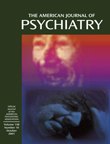Psychopathy is a construct that arises out of the writings of Cleckley, particularly his book,
The Mask of Sanity (1). It has been explored further by the use of the Hare Psychopathy Checklist—Revised
(2). The concept of psychopathy differs from the DSM-IV diagnosis of antisocial personality disorder in a number of ways, particularly in that the DSM-IV criteria have a more limited focus on a social deviance/criminal activity model. The criterion of lack of remorse in DSM-IV comes closest to the aspects of personality highlighted in Cleckley’s construct of psychopathy. The Cleckley psychopathy criteria focus on 16 personality traits reflecting the psychopath’s deceitfulness, impulsiveness, pathological interpersonal relationships, and irresponsibility. The Hare checklist, a 22-item checklist consisting of an interview and review of collaborative data based largely on the Cleckley criteria, has proved to be a useful research tool in settings where a large percentage of the study group meet the criteria for an antisocial personality disorder diagnosis. Psychopathy can be diagnosed by using the Hare checklist in a subset of those diagnosed with antisocial personality disorder and even in those not meeting these criteria. In particular, the Hare checklist has been proven in several studies to have robust predictive value for violent recidivism.
This volume was conceived after high levels of interest in psychopathy persisted into late-night group discussions after an Advanced Studies Institute on psychopathy supported by the North Atlantic Treaty Organization. The result is a multiauthored text by leaders in the field of psychopathy assessment, with important contributions by the editor, Carl B. Gacono.
This compilation is divided into three sections. The first, Conceptual Contributions, focuses on the construct of psychopathy, how it differs from the DSM-IV diagnosis of antisocial personality disorder, and its different manifestations in children and adults. The Hare checklist, a key assessment tool for the psychopathy construct, is reviewed in detail. Also included in this section are chapters on information processing deficiencies and the emotional experience of psychopaths. The second section of the book, Clinical Issues and Applications, focuses on assessment of psychopathy, primarily using the Hare checklist, and clinical aspects of the assessment process. Risk assessment and detection of malingering and deception are some of the particular areas that arise with this population. The final section addresses a number of special applications of psychopathy assessment, including the areas of manipulation at work, substance abuse, sexual aggression, criminal lifestyle, and hostage negotiations.
The chapter on the Hare checklist offers an introduction for readers who are not familiar with this research tool. The 22 questions on the scale can be divided into two sets of factors—interpersonal/affective dimensions and social deviance. The use of the Hare checklist requires specialized training, which is beyond the scope of this book. Reliability and validity of this test have been established. Having a reliable and valid test has allowed meta-analyses to be conducted on of a number of independent studies using the Hare checklist to examine psychopathy’s role in different forensic settings.
This volume is part of the Personality and Clinical Psychology Series, edited by Irving B. Weiner. As the titles of the book and the series imply, the primary audience is the psychologist in a forensic setting. For other professionals who work in forensic settings, or have an interest in the applicability of the psychopathy construct, there are some helpful sections on clinical applications. Studies and meta-analyses of studies offer interesting empirical data about aspects of psychopathy. The chapter on psychopathic manipulation at work may interest anyone who has dealt with dysfunctional organizational dynamics centered around a controversial employee. Such psychopaths exhibit psychopathic personality traits without committing criminal acts. Instead, they present as co-workers initially liked by everyone but, over time, often generate camps of strong supporters and detractors, creating havoc in the organization. Also helpful to clinicians is the information on malingering and deception related to psychopathy. Overall, however, this volume’s focus on assessment limits its usefulness to those who are trained to administer the Hare checklist or other psychological assessment tools or are familiar with their application.

